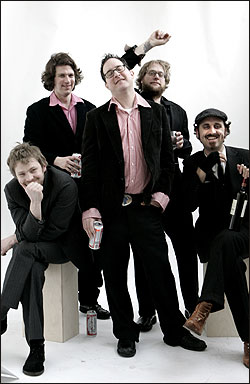When Craig Finn left Minneapolis at the end of 2000, he had no plans to start another band. Relocating to Brooklyn, he left behind a band called Lifter Puller, who were nearly legendary in the Twin Cities and a pocketful of other places; but outside of independent music circles, Lifter Puller remained mostly unknown. But by the time of 2002’s Soft Rock, a Frenchkiss-issued double-CD collection of nearly everything the band had recorded that wasn’t on 2000’s brilliant finale, Fiestas + Fiascos, that had changed: Thanks to Internet word of mouth, Lifter Puller had achieved something of a rabid posthumous cult.
Finn, who took a day job at a digital music distributor in New York City, continued to write songs on his laptop but didn’t play shows. Then a friend in an improvisational comedy group called Mr. Ass asked Finn to supply incidental music for a performance. Drafting former Lifter Puller guitarist Tad Kubler, and bassist Galen Polivka and drummer Judd Counsell from fellow ex-Minneapolitans Punchdrunk, Finn went back on the stage and was immediately drawn to the bar-band aesthetic of the performance’s incidental music. The experience convinced Finn to form a band, and in 2003, the Hold Steady was born.
Fans of Lifter Puller will be familiar with Finn’s inimitable songwriting and delivery. Stories of sin, redemption, and swinging parties spill from Finn’s mouth as if he can’t tell them quickly enough. Finn builds alternate universes with his lyrics, filling his urban terrarium with life and shaking it up periodically just to see what happens. Despite his move to New York City, Finn’s songs have not taken on the claustrophobia that comes with urban living; instead, the flyover landscape in which the majority of Finn’s songs are set functions as a metaphor for a shared suburban experience, an outwardly bucolic mind-set that he finds applicable to Americans everywhere.
The original four-piece Hold Steady recorded last year’s The Hold Steady Almost Killed Me; on the new Separation Sunday (Frenchkiss), Counsell plays on half the songs, while the other half are handled by Bobby Drake, now the band’s full-time drummer. The new disc also features keyboardist Franz Nicolay, whose piano and organ give the disc an even more distinctively classic-rock tint than the debut. Listening to these albums, it may appear at first listen that only the names have changed from the Lifter Puller days. According to Finn, this is not technically true.
Seattle Weekly: What sets the Hold Steady apart from Lifter Puller?
Craig Finn: There’s more space in this band. With Lifter Puller, we ended up being indie for its own sake. The Hold Steady is more informed by classic rock, with a small C. It’s a feeling that you get driving around listening to the car radio. There are more guitar solos, period. Classic rock doesn’t get any older. Kids these days listen to System of a Down and Linkin Park, but I can’t see them listening to that 20 years from now, whereas you’ll always hear a Led Zeppelin record at a party.
Describe the importance of Tad Kubler to the Hold Steady aesthetic.
He has a very natural playing style. He’s a very strong musician. He’s the kind of musician who, if you asked him to, could play Mötley Crüe’s Too Fast for Love all the way through, in order. [These] songs are more simple musically.
Did you recognize the need to add to the speed canon? Crystal meth figures prominently in the Hold Steady’s work.
It’s not really glamorous. It doesn’t get you immediately—the first year is free. But after that, you’re hooked. A lot of [meth] cooks are using abandoned ice-fishing shacks now. But yeah, there haven’t been that many good speed songs. I think “London’s Burning” by the Clash was the last good one.
Your drug references are so convincing that it’s hard to believe you haven’t had that experience.
Not outside of experimentation in college, anyway. I’m kind of a baby about hangovers. I worry about how I’ll feel the next day. The characters [I write about in the songs] are composites.
What is the Hold Steady songwriting process like?
For the past five years, I’d been writing songs on a laptop. Then a friend suggested that I use composition books, which works out a lot better for me. I write something in a book every day. When we write songs, Tad will have a riff, and I’ll pull something out of the notebook. Sometimes, I’ll use two things from two different days if I need something.
The horns in Hold Steady songs make your music even more Springsteen-esque. Is this intentional? How do you feel about the lukewarm reviews his latest album, Devils and Dust, has been getting?
Springsteen is a brilliant songwriter, obviously. He does what he does for a reason—he knows what he’s doing better than I do. He knows where on the basketball court he’s throwing the ball. His music is both timely and timeless. [But] Clarence Clemons makes other horn players irritated in the same way that Billy Joel makes other pianists irritated. Franz, our pianist, hates Billy Joel because people are always calling him the Piano Man.
Is that because Clemons popularized the black mullet?
Nah, it’s just because he’s the best- known rock saxophonist—the one every-one knows.
The Hold Steady play the Crocodile Cafe with U.S.E. and the Cops at 9 p.m. Thurs., June 9. $8 adv./$10.




